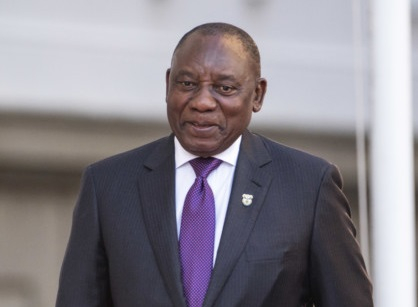
Former South African President Jacob Zuma gave something of a Valentine’s Day gift to his critics: After grimly clinging to power for weeks as his own allies turned against him, the embattled Zuma announced his resignation, ending nearly a decade in power.
Last week, leading officials of Zuma’s ruling African National Congress (ANC) had urged him to resign amid spiralling corruption allegations. Last Wednesday, news broke of police raids on the family residence of Zuma’s close business partners, who were implicated in the alleged looting of state resources indelibly associated with Zuma’s tenure.
Zuma remained defiant that afternoon, declaring there was “nothing I’ve done wrong” and warning that supporters could take to the streets. But he could not evade the humiliating blow that South African lawmakers, including those in the ANC, were planning to deliver in the form of a no-confidence vote. Bowing to public pressure, Zuma pre-empted them and resigned.
“No life should be lost in my name. The ANC should never be divided in my name,” he said during a Wednesday night speech. “I have therefore come to the decision to resign as president of the republic with immediate effect.” The resignation makes Zuma’s deputy, Cyril Ramaphosa, both the country’s acting leader “and a man now charged with salvaging the legacy of Africa’s most famous liberation movement”, my Washington Post colleagues wrote. Zuma’s departure is big news, but it was hardly a shock. His exit has been inevitable since the ANC leadership election in December, in which Zuma tried to install his former wife, Nkosazana Dlamini-Zuma, as the party’s leader and his heir apparent. But she lost to Ramaphosa, a former labour union leader-turned wealthy businessman who campaigned on fighting corruption and reviving South Africa’s economy. After the defeat, it was only a matter of when, not if, Zuma would step aside.
Some analysts suggested Zuma’s desperation to stay in the office he has held since 2009 was linked to the scandals floating around him, including his construction of a lavish mansion in his rural hometown. “After leaving office, he will face hefty legal bills related to a number of cases against him,” the Economist noted. “He is facing further charges related to a 1999 arms deal in which Mr. Zuma is accused of 783 counts of corruption.”
Zuma’s colleagues in the ANC are now keen to finally turn the page on a chaotic period that has led to a marked slide in their electoral fortunes.
Last month, Ramaphosa led a South African delegation to the World Economic Forum, championing South Africa’s new-found political stability and its economic prospects. Implicit in their pitch was the importance of sidelining Zuma. “For the first time in many years, I see a great deal of optimism” among investors and business leaders in Davos, Jeff Radebe, a senior government minister and ANC veteran, said. This “positive sentiment,” he claimed, could be attributed to “the political situation now unfolding in South Africa”.
But many South Africans don’t share the optimism. After more than two decades of ANC rule, they point out, dreams of post-apartheid equality have given way to the grinding realities of one of the most unequal societies on the planet.
“Under white minority rule, the racist National Party government had dispensed its largesse unequally and unfairly, ensuring that blacks were denied access to key resources while supporting the advancement of whites,” Daily Maverick columnist Sisonke Msimang wrote in Foreign Policy. “Under the new democratic dispensation, the government was supposed to become a standard-bearer of equality, demonstrating respect and providing dignity to those who had been denied everything from water to education. Instead, it ended up enriching bureaucrats and politicians while failing to deliver the basic services it might have been capable of providing had some officials not been siphoning off millions of rands.”
During Zuma’s divisive tenure, the ANC steadily lost much of its urban support, as well as the influential labour unions that once buttressed the party’s struggle against apartheid. “Ramaphosa ... may sustain significant support from business, the middle classes and people sickened by the scale of the looting and obfuscation under Zuma,” wrote Richard Pithouse, an associate professor at the Wits Institute for Social and Economic Research in Johannesburg. “But the redemptive sense that the ANC carries the destiny of the nation, that it is permanently sanctioned by history, will not be restored.”
At a time when various African nations are shrugging off long-ruling demagogues, Zuma’s successors will need to find a new path. “South Africa finds itself in its current situation because the country has succumbed to ... patriarchal and elite interests,” wrote Cheryl Hendricks, a professor of political science at the University of Johannesburg. “But changing the president, though necessary, won’t be sufficient to get South Africans out of this quagmire. South Africans need new leaders as well as new forms of leadership that understand the driving forces of post-colonial states and their proclivity towards non-democratic forms of governance.”
The success of South Africa’s democratic experiment is not simply of domestic importance, either. “If, despite all this, South Africa slides inexorably backwards, cynicism about the future of the African continent will grow in the rest of the world,” Financial Times columnist Gideon Rachman warned. “Some Africans will be infuriated by this tendency to generalise about the fate of an entire continent from the events in just one country. But the drama of South Africa’s recent history and the sophistication of its economy means that it inevitably has become a standard-bearer for Africa.”
The silver lining to Zuma’s legacy, Msimang said, is that his “penchant for looting and mismanagement has unwittingly strengthened the indomitable will of South Africa’s more than 55 million residents”. And it means that Ramaphosa, should he, too, disappoint, “will have a much shorter leash with which to hang himself”.
— Washington Post
Ishaan Tharoor writes about foreign affairs. He previously was a senior editor and correspondent at Time magazine, based first in Hong Kong and later in New York.









